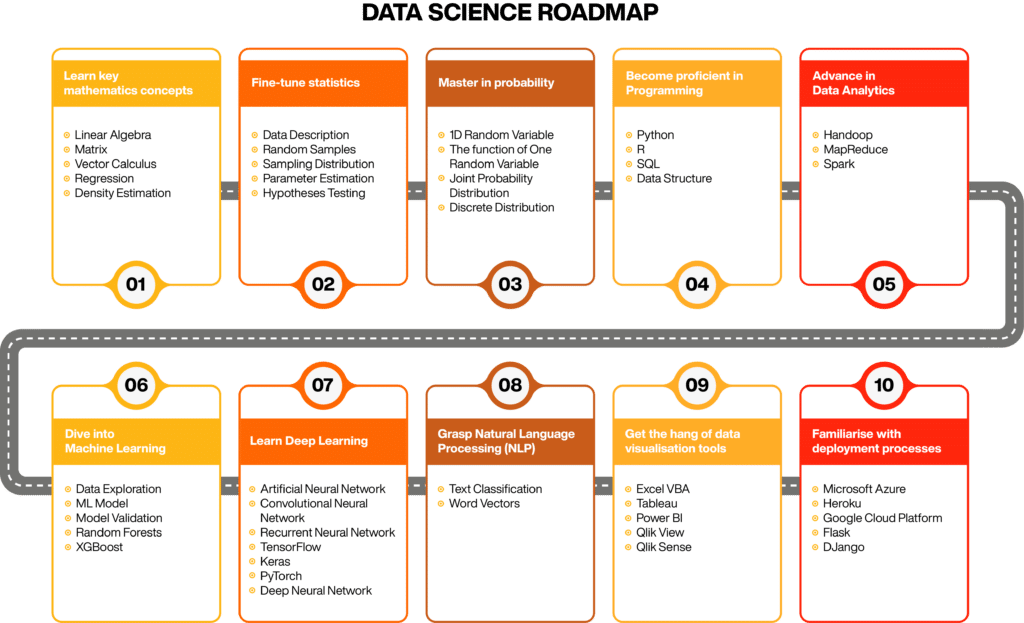Listen to this blog
Key takeaways:
- Data analysts are in high demand as data quantities grow at an accelerating rate.
- As a data analyst, your major responsibility will be to work with your company to detect problems and use data to provide solutions for better decision-making.
- For survival, growth, and to keep one step ahead of the competition, companies are becoming increasingly dependent on the expertise of data analysts.
Every year, there is a larger need than availability for data scientists and analysts to fill these positions. All the required important skills for a data analyst should be mentioned in the resume. They can test several outcomes to determine which would be best for the organization, in addition to extracting and analyzing information to ensure the appropriate course is taken.
A data analyst analyzes data and provides insights using technical expertise. They collect and analyze enormous, well-organized, and poorly-organized data sets. Before leveraging the knowledge to develop workable solutions for organizations, this profession uses its arithmetic, statistics, and computer science expertise to analyze vast amounts of data. It focuses on looking into the information’s source, finding its patterns, and finally making it useful for enterprises.
Here are some of the important skills for data analyst must have.
Most in-demand skills for a data analyst role

Although there are more prospects for careers in data analysis, there aren’t enough data analysts with the requisite skills. The various skills needed by data analysts are discussed below.
- Data exploration
Although it may seem odd to include “data analysis” in a list of important data analyst skills, analysis as a specialized skill is essential. Data analysis, in its most basic form, entails taking a business question or a requirement and evaluating pertinent data to create a response to that question.
Another sort of analysis is data exploration. Data exploration seeks out interesting patterns or relationships in the data that can be useful for business. An exploratory process could be mostly unguided or guided by a business question. By looking for trends in the data, you can find a solution for the organization to reduce expenses or increase sales.
- Hold on to programming languages for analytics
Excel cannot do complex analysis, but statistical programming languages like R or Python can. You can clean, analyze, and visualize massive data sets more effectively if you can develop programs in these languages. It is one of the most essential important skills for a data analyst.
The ideal language for data analysis is a subject of some discussion. Both languages are capable of doing comparable data analysis jobs. Python is the more well-known of the two and is typically simpler to learn, even though R was created expressly for analytics.
Knowing SQL enables you to query, arrange, and update data stored in relational databases and change data structures (schema). The essential skill to learn to get a job is probably SQL because practically all data analysts will need to utilize it to retrieve data from a company’s database.
- Probability and statistics
Statistics and probability are vital data analyst skills. This information will direct your investigation and exploration and aid in interpreting the data. Depending on the requirements of your specific profession and the data you have dealing with, a different level of statistical knowledge may be required.
A strong understanding of statistics and probability will enable you to:
- Produce reliable and accurate findings.
- Determine the data’s trends and patterns.
- Avoid biases, false premises, and logical flaws in your analysis.
You will need a far more thorough understanding of these topics than you would normally require if your company relies on probabilistic analysis.
- Data management
Data management is the method of gathering, organizing, and keeping data in a way that is effective, secure, and economical. Data analysts frequently manage data in some way, even though some organizations will have jobs such as data architects and engineers, database administrators, and information security analysts.
Data management systems are utilized differently by various companies. It can be beneficial to thoroughly understand how databases function in physical and cloud contexts as you build your skill set.
- Data visualization
Making patterns and trends in data clear is a part of data visualization. Most people will understand a chart or graph more quickly than a spreadsheet because humans are primarily visual.
This entails producing organized, visually appealing charts that will aid others in comprehending your findings. It also entails avoiding practices that can be deceptive, such as changing axis values, or that are not easy to comprehend, such as pie charts. Data visualization is a crucial data analyst skill because it is quite difficult to find a data science position that doesn’t involve it.
- Problem-solving
You encounter problems, defects, and barriers daily as a data analyst. Another essential skill for a data analyst is working your way out of problems. Strong problem-solving skills will always be a huge asset for any data analyst, regardless of the complexity.
To become a data analyst professional, one needs to be able to manage complexity. When necessary, one must make sure one can come up with original ideas and create solutions that work. Breaking the challenges into different sections and organizing them may help you overcome obstacles in generating any solution that calls for clarity in data science concepts.
These are some probable consequences –
- You could be using insufficient data.
- You might need to do some analysis on a bug in the program or coding language you are using.
- To fulfill a challenging deadline, you might need to conduct adequate analysis.
- It is possible that your business’s resource limitations compel you to think creatively about how you solve problems.
- Communication skills
A data analyst must explain complex ideas using simple language and clear examples. This skill may be useful in negotiations and persuasion when attending a meeting. You have effectively communicated if a non-technical data user can understand the general idea of what you are saying. This is one of the most important data analyst roles and responsibilities in a resume.
Data analysts conduct descriptive, predictive, and actionable insights to investigate, assess, and communicate data discoveries. They may effectively communicate their views to everyone in attendance by using their communication abilities to provide pertinent background.
How to improve your data analyst skills?
There can be more skills that certain employers want that aren’t on this list. The focus was on identifying the abilities that most data analyst professions demand to create the optimal data analyst learning pathways for students.
These are some suggestions that will help you strengthen your data analysis skills.
- Know the meaning of analytical abilities
- Begin with a distinct structure
- Determine which analytical tools can be useful
- Find suggestions and innovative methods to grow
- Concentrate on the analytical abilities necessary for the project
It may be challenging to work as a data analyst but the correct course to earn your desired degree is a significant choice. If you want to work as a data analyst, you should enroll in the Manipal Academy of Higher Education’s (MAHE) online M.Sc. in Data Science program available on the Online Manipal website.
What does a data analyst’s resume look like?
As a data analyst, remember to update your resume as you add new skills to your toolbox. Mention a skills section where you identify your best five data analysis skills in a bulleted list. Be ready to discuss any skills mentioned in your resume throughout your interview.
Additionally, it makes sense to apply your skills in the right situation. Try to include a line describing how you used a certain skill to accomplish a task when you include data analysis projects or past responsibilities (for example, “Wrote a Python script to scrape data using the official Twitter API” or “used Tableau to show product sales over time”).
You can use the following pattern to write your entry-level data analyst resume –
- Professional summary
- Education
- Certification
- Skills (Example – Communication | Mathematics |SQL | Attention to detail | Python)
- Experience
Final word
Use real-world data to refine your machine learning, predictive modeling, statistics, and big data analytics skills. Learn how to establish a team, develop tactical and strategic recommendations, and execute them.
Data will be essential to the operation of the company in the future. By integrating data analytics tools, companies can predict future growth, identify potential issues, and create successful plans.
Online Manipal’s MSc in Data Science program will prepare you to master key big data concepts and implement its numerous services offered by the best industry experts. If you have been considering learning some important skills as a data analyst, enroll today!
Become future-ready with our online M.Sc. in Data Science program
View All Courses








